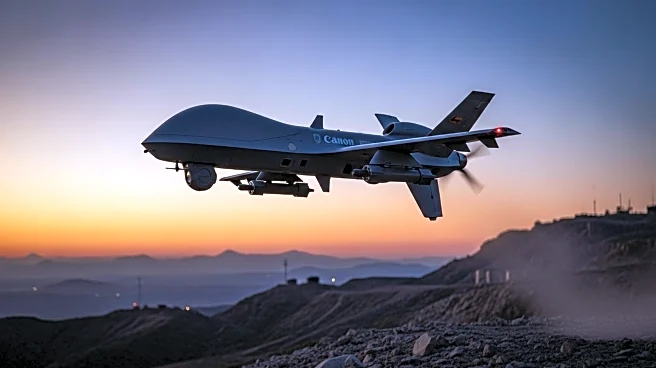What's Happening?
Russia is ramping up its military spending, indicating a lack of preparation for peace in Ukraine, according to Alexander Kokcharov, a geoeconomics analyst at Bloomberg Economics. The Russian government has unveiled a draft budget that maintains high levels of defense and security spending from 2026 to 2028. This move comes amid stalled U.S.-led ceasefire efforts in Ukraine. The budget proposes 13 trillion rubles ($157 billion) for defense in 2026, slightly less than the current year's post-Soviet high of 13.5 trillion rubles. The Finance Ministry has also suggested raising the value-added tax (VAT) from 20 percent to 22 percent to support military expenditures and address the budget deficit. This high level of spending reflects the Kremlin's prioritization of military solutions over diplomatic ones, particularly concerning Ukraine.
Why It's Important?
The continued high military spending by Russia has significant implications for global politics and economics. It underscores Russia's commitment to its military objectives in Ukraine, potentially prolonging the conflict and increasing regional instability. This spending places additional strain on Russia's economy, already impacted by international sanctions, and could lead to higher inflation rates domestically. The proposed VAT increase may further burden Russian citizens, highlighting the government's prioritization of military funding over economic relief. For Ukraine, this development suggests ongoing challenges in achieving peace and stability, as Russia's military capabilities remain robust. The situation also affects European nations, which may need to bolster their own defense spending in response to perceived threats from Russia.
What's Next?
The draft budget and proposed VAT increase are set to be reviewed by the State Duma, Russia's lower house of parliament, on October 22. This review will determine the final allocation of resources for defense spending and the implementation of tax changes. The outcome could influence Russia's economic policies and its approach to the conflict in Ukraine. Additionally, European countries and NATO allies may respond by adjusting their defense strategies and budgets to counteract Russia's military posture. The international community will likely continue to monitor Russia's actions closely, considering potential diplomatic or economic measures to address the ongoing conflict.
Beyond the Headlines
Russia's focus on military spending raises ethical and legal questions about the prioritization of defense over civilian needs. The increased budget for military purposes, including classified expenditures, suggests a lack of transparency and accountability in government spending. This approach may lead to long-term economic challenges for Russia, as resources are diverted from social programs and infrastructure development. The situation also highlights the broader geopolitical tensions between Russia and Western nations, with potential implications for international relations and security policies.










